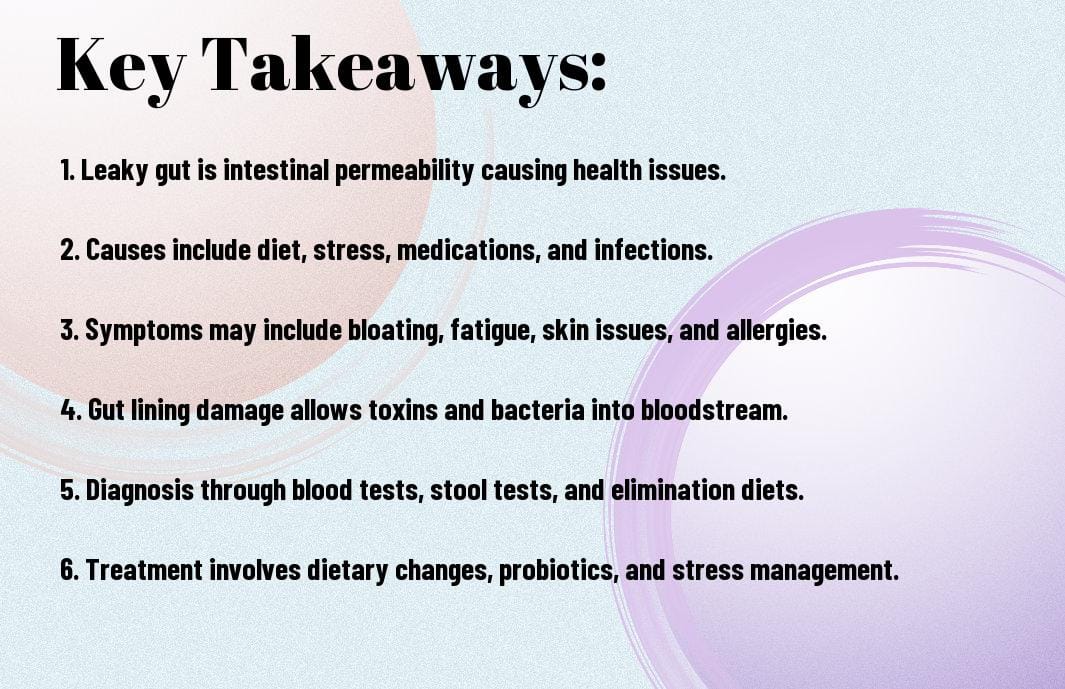It’s crucial to recognize the signs and causes of Leaky Gut Syndrome to address this common digestive condition effectively. Leaky Gut Syndrome occurs when the intestinal barrier is compromised, allowing toxins and undigested food particles to leak into the bloodstream, triggering inflammation and various health issues. Understanding the symptoms can help in early detection and implementing necessary lifestyle changes and treatments promptly. To learn more about the symptoms of Leaky Gut, check out this guide on 9 Symptoms of Leaky Gut & What To Do.

The gastrointestinal tract plays a crucial role in our overall wellbeing. It is a complex system responsible for digesting food, absorbing nutrients, and eliminating waste. The GI tract consists of various organs, including the stomach, small intestine, and large intestine, each with specific functions that contribute to the body’s overall health.
The gut microbiota, comprised of trillions of bacteria, fungi, and other microorganisms, plays a vital role in maintaining gut health and overall wellbeing. These microorganisms aid in digestion, nutrient absorption, immune function, and even mental health. They help in breaking down food, producing imperative vitamins, and protecting the gut from harmful bacteria.
Plus, the gut microbiota communicates with the immune system and influences inflammation levels in the body. An imbalance in the gut microbiota, known as dysbiosis, can lead to various health issues, including leaky gut syndrome. Maintaining a healthy balance of gut bacteria is imperative for overall wellbeing and optimal functioning of the body.
One of the leading causes of leaky gut syndrome is dietary influences. Any imbalance in the diet, such as excessive consumption of processed foods, sugars, gluten, and dairy, can lead to inflammation in the gut lining, making it more permeable and allowing toxins and pathogens to enter the bloodstream.
This is compounded by environmental and lifestyle factors. An overload of stress, excessive alcohol consumption, and exposure to environmental toxins can all contribute to gut inflammation and compromise the intestinal barrier, leading to leaky gut syndrome.
For instance, chronic stress triggers the release of cortisol, a hormone that can disrupt the balance of gut bacteria and increase intestinal permeability. This can further exacerbate the symptoms of leaky gut syndrome and impact overall health.
The development of leaky gut syndrome can also be influenced by genetic predisposition and autoimmunity. The genetic makeup of an individual can play a role in how their immune system responds to triggers that may cause increased intestinal permeability.
Another factor to consider is the presence of autoimmune conditions, where the immune system mistakenly attacks the body’s own tissues, including the intestinal lining. This can lead to chronic inflammation and damage to the gut barrier, contributing to the development of leaky gut syndrome.
Factors such as prolonged use of nonsteroidal anti-inflammatory drugs (NSAIDs), antibiotics, and certain medications can also contribute to the development of leaky gut syndrome. Medications that disrupt the balance of gut bacteria or weaken the intestinal lining can increase the risk of intestinal permeability and leaky gut syndrome.
Medications that alter the gut microbiome or directly damage the intestinal barrier can have implications for gut health and may contribute to the development or exacerbation of leaky gut syndrome. It is important to be aware of the potential impact of medications on gut health and to consult with a healthcare provider about alternative options or ways to mitigate their effects on the gut.
Leaky gut syndrome can present with a variety of common gastrointestinal symptoms, such as bloating, gas, diarrhea, constipation, and abdominal cramps. These symptoms may come and go, making it challenging to pinpoint the exact cause without thorough evaluation.
With leaky gut syndrome, systemic manifestations may also occur, including fatigue, joint pain, headaches, and skin issues like acne or eczema. This is due to the increased permeability of the gut, allowing toxins and bacteria to leak into the bloodstream and trigger an immune response throughout the body.
Gastrointestinal symptoms are often the first indication of leaky gut syndrome, but it’s necessary to recognize the systemic manifestations as well. These symptoms can overlap with various conditions, making the diagnosis of leaky gut syndrome a complex process that requires a comprehensive assessment of an individual’s medical history and symptoms.
Symptoms of leaky gut syndrome can mimic those of other digestive disorders such as irritable bowel syndrome (IBS), Crohn’s disease, or celiac disease. However, a distinguishing factor is the presence of systemic manifestations beyond gastrointestinal symptoms. The key lies in recognizing the interconnectedness of the gut with other bodily systems and addressing the root cause of the symptoms.
Many diagnostic approaches are commonly used in the identification of leaky gut syndrome. Conventional medical assessments typically involve a thorough patient history, physical examination, and laboratory tests to evaluate overall health. Any signs of inflammation, malabsorption, or immune system dysregulation may indicate the presence of leaky gut syndrome.
Many healthcare professionals are embracing emerging diagnostic techniques to further understand and diagnose leaky gut syndrome. Emerging technologies such as advanced stool testing, intestinal permeability assays, and the measurement of zonulin levels in the blood are being utilized to provide more detailed insights into gut health. Emerging evidence suggests that these techniques may offer a more comprehensive understanding of the underlying causes of leaky gut syndrome.
Approaches
Ultimately, understanding leaky gut syndrome and its causes and symptoms is crucial for addressing this condition effectively. By recognizing the factors that contribute to a compromised intestinal barrier and being aware of the signs that may indicate its presence, individuals can take proactive steps to improve gut health and overall well-being. With a combination of lifestyle changes, dietary modifications, and potentially medical interventions, it is possible to manage and even reverse the effects of leaky gut syndrome. It is important to consult with a healthcare professional for a proper diagnosis and personalized treatment plan. By staying informed and proactive, individuals can make significant strides towards healing their gut and restoring balance to their bodies.
This post contains affiliate links. I will earn a commission if you buy through my link.
It’s crucial to recognize the signs and causes of Leaky Gut Syndrome to address this common digestive condition effectively. Leaky Gut Syndrome occurs when the intestinal barrier is compromised, allowing toxins and undigested food particles to leak into the bloodstream, triggering inflammation and various health issues. Understanding the symptoms can help in early detection and implementing necessary lifestyle changes and treatments promptly. To learn more about the symptoms of Leaky Gut, check out this guide on 9 Symptoms of Leaky Gut & What To Do.

The gastrointestinal tract plays a crucial role in our overall wellbeing. It is a complex system responsible for digesting food, absorbing nutrients, and eliminating waste. The GI tract consists of various organs, including the stomach, small intestine, and large intestine, each with specific functions that contribute to the body’s overall health.
The gut microbiota, comprised of trillions of bacteria, fungi, and other microorganisms, plays a vital role in maintaining gut health and overall wellbeing. These microorganisms aid in digestion, nutrient absorption, immune function, and even mental health. They help in breaking down food, producing imperative vitamins, and protecting the gut from harmful bacteria.
Plus, the gut microbiota communicates with the immune system and influences inflammation levels in the body. An imbalance in the gut microbiota, known as dysbiosis, can lead to various health issues, including leaky gut syndrome. Maintaining a healthy balance of gut bacteria is imperative for overall wellbeing and optimal functioning of the body.
One of the leading causes of leaky gut syndrome is dietary influences. Any imbalance in the diet, such as excessive consumption of processed foods, sugars, gluten, and dairy, can lead to inflammation in the gut lining, making it more permeable and allowing toxins and pathogens to enter the bloodstream.
This is compounded by environmental and lifestyle factors. An overload of stress, excessive alcohol consumption, and exposure to environmental toxins can all contribute to gut inflammation and compromise the intestinal barrier, leading to leaky gut syndrome.
For instance, chronic stress triggers the release of cortisol, a hormone that can disrupt the balance of gut bacteria and increase intestinal permeability. This can further exacerbate the symptoms of leaky gut syndrome and impact overall health.
The development of leaky gut syndrome can also be influenced by genetic predisposition and autoimmunity. The genetic makeup of an individual can play a role in how their immune system responds to triggers that may cause increased intestinal permeability.
Another factor to consider is the presence of autoimmune conditions, where the immune system mistakenly attacks the body’s own tissues, including the intestinal lining. This can lead to chronic inflammation and damage to the gut barrier, contributing to the development of leaky gut syndrome.
Factors such as prolonged use of nonsteroidal anti-inflammatory drugs (NSAIDs), antibiotics, and certain medications can also contribute to the development of leaky gut syndrome. Medications that disrupt the balance of gut bacteria or weaken the intestinal lining can increase the risk of intestinal permeability and leaky gut syndrome.
Medications that alter the gut microbiome or directly damage the intestinal barrier can have implications for gut health and may contribute to the development or exacerbation of leaky gut syndrome. It is important to be aware of the potential impact of medications on gut health and to consult with a healthcare provider about alternative options or ways to mitigate their effects on the gut.
Leaky gut syndrome can present with a variety of common gastrointestinal symptoms, such as bloating, gas, diarrhea, constipation, and abdominal cramps. These symptoms may come and go, making it challenging to pinpoint the exact cause without thorough evaluation.
With leaky gut syndrome, systemic manifestations may also occur, including fatigue, joint pain, headaches, and skin issues like acne or eczema. This is due to the increased permeability of the gut, allowing toxins and bacteria to leak into the bloodstream and trigger an immune response throughout the body.
Gastrointestinal symptoms are often the first indication of leaky gut syndrome, but it’s necessary to recognize the systemic manifestations as well. These symptoms can overlap with various conditions, making the diagnosis of leaky gut syndrome a complex process that requires a comprehensive assessment of an individual’s medical history and symptoms.
Symptoms of leaky gut syndrome can mimic those of other digestive disorders such as irritable bowel syndrome (IBS), Crohn’s disease, or celiac disease. However, a distinguishing factor is the presence of systemic manifestations beyond gastrointestinal symptoms. The key lies in recognizing the interconnectedness of the gut with other bodily systems and addressing the root cause of the symptoms.
Many diagnostic approaches are commonly used in the identification of leaky gut syndrome. Conventional medical assessments typically involve a thorough patient history, physical examination, and laboratory tests to evaluate overall health. Any signs of inflammation, malabsorption, or immune system dysregulation may indicate the presence of leaky gut syndrome.
Many healthcare professionals are embracing emerging diagnostic techniques to further understand and diagnose leaky gut syndrome. Emerging technologies such as advanced stool testing, intestinal permeability assays, and the measurement of zonulin levels in the blood are being utilized to provide more detailed insights into gut health. Emerging evidence suggests that these techniques may offer a more comprehensive understanding of the underlying causes of leaky gut syndrome.
Approaches
Ultimately, understanding leaky gut syndrome and its causes and symptoms is crucial for addressing this condition effectively. By recognizing the factors that contribute to a compromised intestinal barrier and being aware of the signs that may indicate its presence, individuals can take proactive steps to improve gut health and overall well-being. With a combination of lifestyle changes, dietary modifications, and potentially medical interventions, it is possible to manage and even reverse the effects of leaky gut syndrome. It is important to consult with a healthcare professional for a proper diagnosis and personalized treatment plan. By staying informed and proactive, individuals can make significant strides towards healing their gut and restoring balance to their bodies.
This post contains affiliate links. I will earn a commission if you buy through my link.
